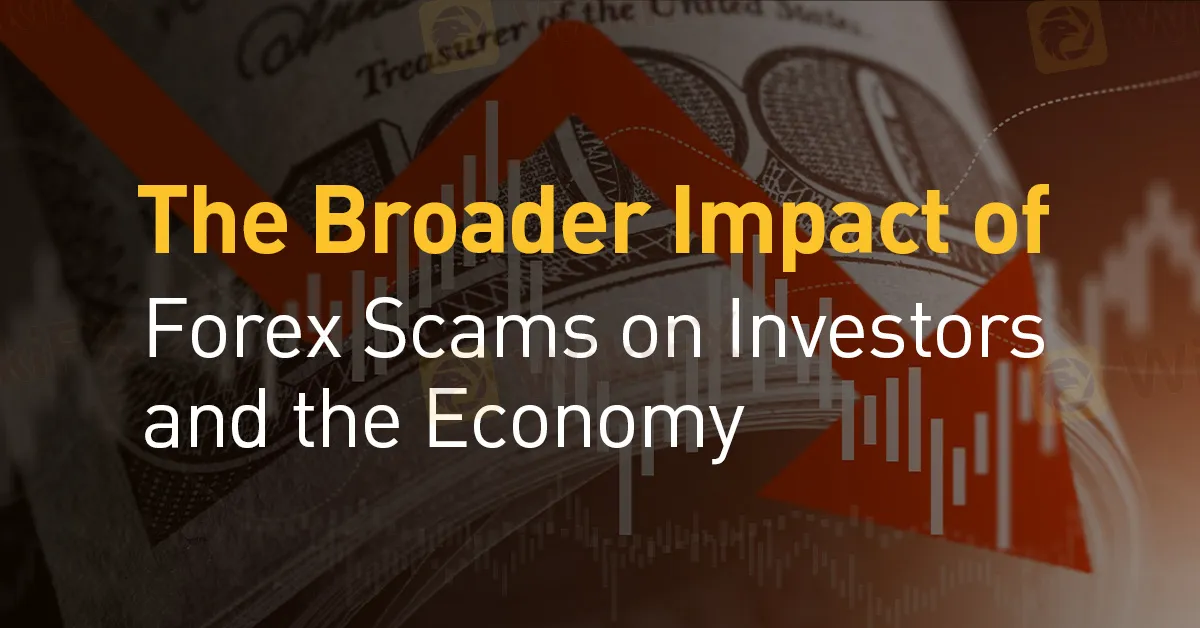简体中文
繁體中文
English
Pусский
日本語
ภาษาไทย
Tiếng Việt
Bahasa Indonesia
Español
हिन्दी
Filippiiniläinen
Français
Deutsch
Português
Türkçe
한국어
العربية
Counting the Cost: The Broader Impact of Forex Scams on Investors and the Economy
Abstract:In the world of forex trading, the allure of financial gain is often accompanied by the ever-present threat of scams. The United Kingdom and Europe, known for their robust financial landscapes, have not been immune to the impact of forex scams. This article delves into the broader implications of these scams, exploring how they affect individual investors, the financial sector, and the economy at large.

In the world of forex trading, the allure of financial gain is often accompanied by the ever-present threat of scams. The United Kingdom and Europe, known for their robust financial landscapes, have not been immune to the impact of forex scams. This article delves into the broader implications of these scams, exploring how they affect individual investors, the financial sector, and the economy at large.
Individual Investors: Shattered Dreams and Financial Ruin
The most immediate and devastating impact of forex scams is felt by individual investors. Those who fall victim to fraudulent schemes often face financial ruin, losing their hard-earned money to deceptive practices. Beyond the monetary loss, the emotional toll can be significant, with shattered dreams of financial prosperity replaced by the harsh reality of scam-induced setbacks.
Undermining Trust in Financial Markets: The Ripple Effect
Forex scams not only harm individual investors but also undermine trust in financial markets. As news of scams spreads, potential investors may become wary of participating in legitimate trading activities, fearing the risk of falling victim to fraudulent schemes. This erosion of trust can have a lasting impact on the credibility of the entire financial sector.
Regulatory Strain: The Burden on Authorities
The prevalence of forex scams places a significant burden on regulatory bodies such as the Financial Conduct Authority (FCA) and the European Securities and Markets Authority (ESMA). These authorities must invest considerable resources in investigating scams, taking legal action against wrongdoers, and implementing measures to protect investors. The strain on regulatory bodies highlights the need for ongoing vigilance and adaptability in the face of evolving scam tactics.
Economic Ramifications: A Drain on Productivity
The economic consequences of forex scams extend beyond the financial sector. As individuals and businesses grapple with losses, productivity may decline. The redirection of resources towards addressing the aftermath of scams, such as legal proceedings and regulatory interventions, can divert attention and funds away from productive economic activities.
Long-Term Repercussions: Strained Market Integrity
The long-term repercussions of forex scams include a strain on market integrity. The prevalence of fraudulent activities can create an environment where genuine traders and investors hesitate to engage, fearing the risk of scams. This hesitancy can impede the normal functioning of financial markets and hinder economic growth.
Addressing the Issue: Education and Vigilance
To mitigate the broader impact of forex scams, a multi-faceted approach is necessary. Education and awareness initiatives aimed at investors can help them recognize and avoid scams, while regulatory bodies must continue to adapt and strengthen measures to combat fraudulent activities. Platforms like WikiFX, with their comprehensive broker database, contribute to creating a safer trading environment by empowering investors with the information needed to make informed decisions.
Visit www.wikifx.com to access WikiFX and take a proactive step towards safeguarding your investments.
Conclusion: A Call to Collective Action
Forex scams transcend individual losses; they pose a threat to the stability of financial markets and the broader economy. Addressing this issue requires a collective effort from regulators, investors, and educational platforms. By fostering a culture of awareness, implementing robust regulatory measures, and leveraging resources like WikiFX, we can work towards creating a more secure and resilient financial landscape for all.

Disclaimer:
The views in this article only represent the author's personal views, and do not constitute investment advice on this platform. This platform does not guarantee the accuracy, completeness and timeliness of the information in the article, and will not be liable for any loss caused by the use of or reliance on the information in the article.
Read more

Pros and Cons of Choosing Unregulated Forex Brokers
Discover the pros and cons of unregulated forex brokers, explore risks, benefits, and key features, and learn how to evaluate their credibility with the WikiFX app.

Gigamax Scam: Tracking Key Suspects in RM7 Million Crypto Fraud
Malaysian authorities are actively pursuing seven individuals linked to the Gigamax investment scam, which has defrauded investors of over RM7 million. The suspects include an Indonesian national, identified as Awaludin, who is believed to be the mastermind behind the scheme, and six Malaysians who served as promoters and speakers for the fraudulent operation.

Elderly Trader Loses RM2.1M in WhatsApp Forex Scam
A 70-year-old trader fell victim to a WhatsApp forex scam, losing RM2.1M. Learn how to safeguard your finances and recover losses with WikiFX support.

792 Arrested in Nigerian Crypto-Romance Scam Bust
Nigeria arrests 792 suspects in a crypto-romance scam targeting Americans and Europeans. Among those detained are 40 Filipinos and 148 Chinese nationals.
WikiFX Broker
Latest News
ASIC Sues HSBC Australia Over $23M Scam Failures
Trader Turns $27 Into $52M With PEPE Coin, Breaking Records
Singaporean Arrested in Thailand for 22.4 Million Baht Crypto Scam
Elderly Trader Loses RM2.1M in WhatsApp Forex Scam
Spotware Unveils cTrader Store, Global Marketplace for Algo Creators
Gigamax Scam: Tracking Key Suspects in RM7 Million Crypto Fraud
WikiFX Review: Is IQ Option trustworthy?
Understanding the Impact of Interest Rate Changes on Forex Markets
FCA Seeks Input to Shape UK Crypto Market Regulations
Broker Review: Is Eightcap Legit?
Currency Calculator


